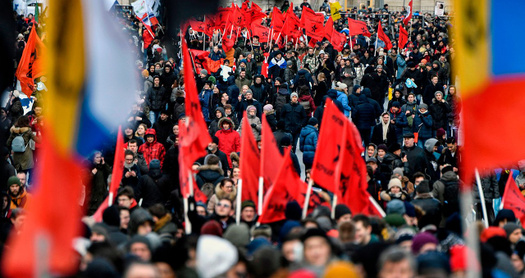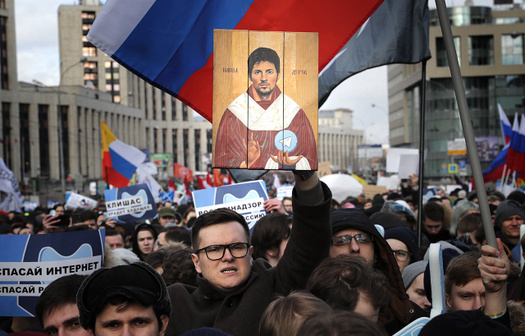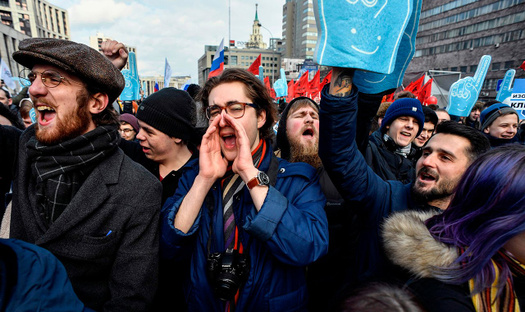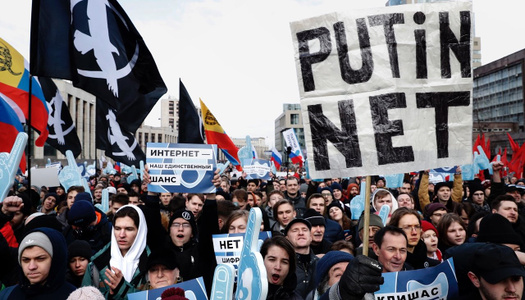
‘We’ve got no alternative but our hatred’ Thousands protest in Moscow against the ‘isolation’ of the Russian Internet
Мы говорим как есть не только про политику. Скачайте приложение.
Over the weekend, Russia’s Libertarian Party staged a public demonstration at Sakharov Prospect in Moscow in support of Internet freedom, as two controversial bills outlawing “fake news” and “insults against state officials” make their way through Parliament. According to monitors from “White Counter,” 15,200 people attended the event. (As usual, the estimate from police was smaller: 6,500 people.) Law enforcement detained more than a dozen demonstrators before the rally even began, including eight activists carrying armfuls of blue balloons, which the authorities seized as “unmanned aerial vehicles.” By the end of the day, 28 people had been detained. Similar demonstrations also took place on March 10 in other cities across the country.
People started gathering near the metal detector arches on Sakharov Prospect around 1:00 p.m. An hour later, when the protest was supposed to begin, thousands of people were still lined up and waiting to pass through. Police officers worked at a leisurely pace, as demonstrators asked them to hurry up. Off to the right, there was a blue-and-white tent where protesters with signs submitted to preliminary inspections of their banners.
“You came here to support the Internet, so your sign should be about the Internet, not the country’s leadership,” an officer explained to a man who wanted to bring in a banner that read, “Putin is lying to us.” The man then collected his sign and headed for the exit.
Eight activists with armfuls of blue balloons were escorted to a police van. When it became evident that the balloons wouldn’t fit inside the vehicle, they were released into the sky. Mikhail Svetov, one of the protest’s organizers and a member of the Libertarian Party, tweeted that law enforcement classified the balloons as “unmanned aerial vehicles.”


Nevertheless, some demonstrators with posters managed to get through. For example, one man carried a sign in support of Anna Pavlikova and Maria Dubovik, two suspects in the “New Greatness” extremism case.
Another poster featured a monkey and a caption reading, “The phone is the Proletariat’s weapon.” In the center of the square, a young man and woman held a sign that said, “Suicide propaganda isn’t Husky’s music videos, but United Russia’s legislation.” They carried loudspeakers playing the song “Fairytale” by the group IC3SPEAK, whose concerts the authorities cancelled in several cities across the country last year.
“At first, I didn’t believe they could really cut us off from the Internet,” said a woman carrying a sign that read, “We want freedom!” “So I didn’t even really consider it a problem. But seeing the absurd lengths officials have gone to lately, I realize that we need to fight, or there will be no stopping it.”
At 2:30, representatives of the Libertarian Party (which organized the rally in the first place) informed the crowd that the event was running behind schedule, as many demonstrators were still being held up outside the security checkpoint. By this time, the square was full of people, with a few thousand more waiting to get through the metal detectors.
Ten minutes later, Libertarian Party Federal Committee member Vladimir Osenin ascended the makeshift stage and declared, “People speak the truth on the Internet, but the authorities want to silence us all. We’ve come here today to say, ‘Hands off the Internet!’” Osenin got a warm welcome, and the crowd chanted his last phrase three times.
Next up was another Libertarian Party leader, Sergey Boiko, who described a conversation he overheard between two police officers on his way to the rally. He said the officers talked about how they “don’t need this Viber or Telegram at all.”
“And what about you?” Boiko asked the crowd. “Could you live without Telegram or Facebook?”
“No!” the demonstrators shouted back.
“Do you appreciate being able to transfer money to the other end of the world in the blink of an eye?” he asked next.
“Yes!”
Boiko then recalled “life under the Iron Curtain,” when the Internet was just an idea and people relied on newspapers, leaflets, and television to communicate, all while the state controlled everything. “Thanks to the open Internet, we free people emerged,” Boiko said proudly. “Thanks to online communication and the information it made available in 2011 and 2012,” he added, referring to the winter protests that followed widespread fraud in parliamentary elections that fall.
According to Boiko, the situation has become significantly worse since that heyday of street activism. Vkontakte, he said, has become “a machine that manufactures prison sentences for memes,” then there were the “anti-terrorism” laws authored by Irina Yarovaya, and now the authorities are preparing to seal off the Russian Internet with a Great Wall and “fine people for insults.”
“Will fines stop us?” Boiko asked demonstrators.
“No!”
“Will arrests stop us?”
“No! We are not afraid!” the crowd chanted in response.

The man who followed Sergey Boiko of the Libertarian Party was somebody else with the same name, this one the director at a local branch of a major telecommunications firm in Novosibirsk, where he “served time for a tweet.” He opened with a joke, saying that the police could arrest one Boiko and another would remain at large. “You’ve got it good here in Moscow. For 4,000 rubles [$60], you can buy a plane ticket, and two hours later you’re somewhere enjoying decent cheese and an open Internet,” the second Boiko said. “But think about it: people in the country, in the regions, and in small towns, they never had decent cheese. If you take away the Internet, what’s left? Hawberries?”
The next speaker was Mediazona chief editor Sergey Smirnov, who explained that today’s authorities are people from the 1970s raised during the Cold War. “They genuinely believe the Internet was invented to take over the world,” Smirnov said. “But people from the past have no chance against people from the future.” Hearing this, the crowd started chanting “Putin is a thief! Russia will be free!”
Artem Kozlyuk, the director of the Internet freedom project “Roskomsvoboda,” took the stage next and announced that his team has launched a project called “Digital Defense,” calling on supporters to flood the State Duma’s inbox with messages stating their opposition to the “Internet sovereignty” bill. “These decisions should be subject to broad public discussions!” Kozlyuk argued. “No to isolation! Leave the RuNet alone!”
Alexander Savin, a member of Russia’s Pirate Party, said the rally had brought together people from both the left and the right. “There’s a monument to the victims of Soviet political repressions right behind us,” the activist said. “If we don’t keep the Internet free, tomorrow we’ll end up just like them. We don’t want to live in a digital prison.”
One of the most emotional speakers at this year’s protest was once again Libertarian Party member Mikhail Svetov, who savaged Senator Andrey Klishas, co-author of the Internet isolation bill, calling him a Russophobe and a criminal.
“They’re not just ruining the Internet, but they’re ruining our lives,” Svetov screamed, nearly losing his voice. “Klishas hates Russians and he hates Russia. Andrey Klishas is a Russophobe!”
“Klishas is a Russophobe!” the crowd chanted back.
The rally’s organizers said they’d invited another “four famous bloggers,” but these individuals got spooked and didn’t show. The event’s musical guest was IC3SPEAK (the same group playing from the speakers mentioned above), who performed their political song “Death No More.”
Vladimir Osenin delivered the demonstration’s closing speech, saying, “I don’t want you to leave this protest today with any sense of accomplishment. We haven’t achieved anything yet. A real danger threatens our lives. You must learn to hate. Russia has no alternative but our hatred.”
“Hands off the Internet!” people chanted, as they trickled out of the square.
Just before 4 p.m., the police started shoving and squeezing the stragglers toward the subway.
Translation by Wesley Fox and Kevin Rothrock